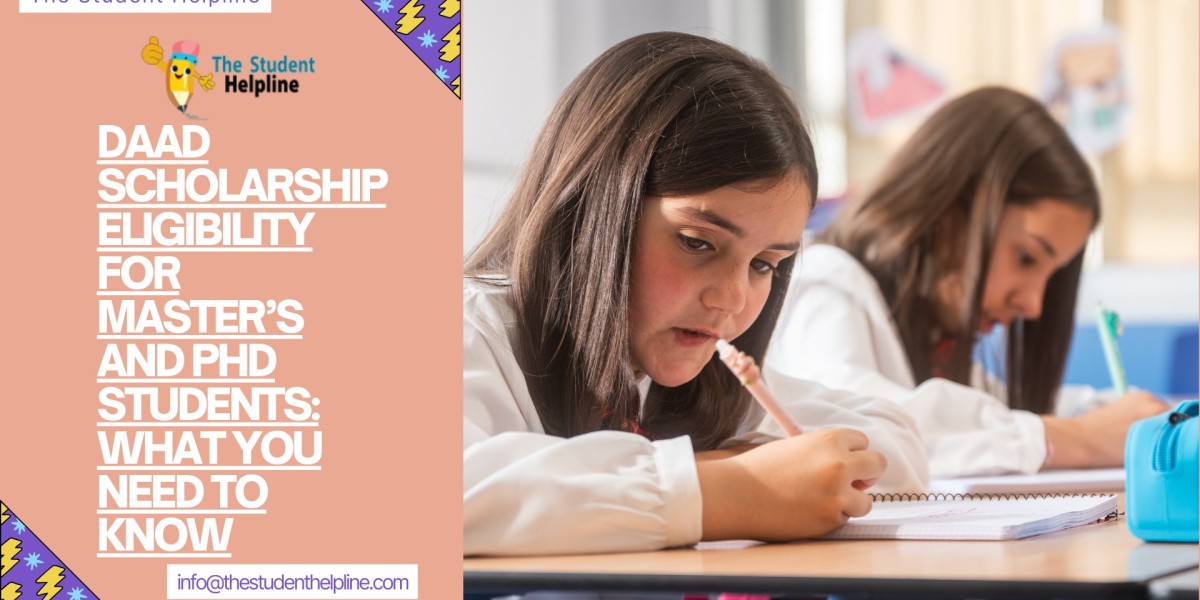The DAAD (German Academic Exchange Service) offers prestigious scholarships to international students who wish to pursue higher education in Germany. However, before applying, it’s crucial to understand the DAAD scholarship eligibility requirements for Master's and PhD students. These scholarships provide funding for a wide range of programs, but eligibility criteria vary depending on the specific scholarship and program you're interested in. Here’s everything you need to know about DAAD scholarship eligibility for Master’s and PhD students.
1. Academic Qualifications
One of the primary DAAD scholarship eligibility requirements for Master’s and PhD students is having the right academic background. For Master’s students, applicants typically need a bachelor’s degree or equivalent from a recognized institution, which should be relevant to the field of study for the program they are applying to.
For PhD applicants, a Master’s or equivalent degree is required. This should be in a discipline that aligns with the research area of the proposed PhD project. The DAAD scholarship eligibility may also include a specific GPA or academic standing, depending on the scholarship program.
2. Age Limit
DAAD scholarships often have age restrictions. For Master’s students, the typical age limit is around 30 years. For PhD applicants, the age limit is usually around 35 years. These age limits are designed to encourage students at a relatively early stage of their academic or professional careers to benefit from the opportunities offered by DAAD scholarships.
It’s important to check the specific age restrictions for the scholarship you are applying to, as these can vary slightly depending on the program.
3. Language Proficiency
DAAD scholarship eligibility for international students also includes language proficiency requirements. While many Master’s and PhD programs in Germany are offered in English, some might require knowledge of German.
For English-taught programs, applicants are generally required to submit proof of English proficiency through exams such as IELTS or TOEFL. For German-taught programs, applicants need to show proficiency in German through exams like the TestDaF or DSH.
Be sure to check the language requirements of the specific program you're applying to, as meeting these requirements is a critical aspect of DAAD scholarship eligibility.
4. Professional Experience (for PhD Applicants)
PhD applicants often need to demonstrate relevant professional experience, especially if the program requires research in a specific area. While it is not a strict requirement for all DAAD scholarships, having prior research experience, publications, or work in the field can strengthen your application.
For example, if you're applying for a PhD scholarship in engineering, having hands-on experience in the engineering field or research projects can help prove your readiness for advanced study.
5. Nationality and Country of Residence
The DAAD scholarship eligibility criteria are also influenced by your nationality and country of residence. Generally, DAAD scholarships are open to students from all over the world, but some programs may have specific regional focuses. For example, some scholarships are targeted at students from developing countries or countries with a specific relationship to Germany.
Make sure to verify whether your nationality or country of residence aligns with the specific eligibility criteria for the DAAD scholarship program you're applying for.
6. Application Documents
To prove your eligibility, you’ll need to submit various documents with your application. Common requirements include:
- A CV (curriculum vitae)
- Academic transcripts and degree certificates
- Proof of language proficiency (e.g., IELTS, TOEFL, TestDaF)
- A research proposal (for PhD applicants)
- Letters of recommendation
- A motivation letter or statement of purpose
Ensure that all documents meet the DAAD scholarship eligibility requirements and are submitted in the required formats. Missing or incomplete documents could lead to disqualification.
7. Research Proposal (For PhD Applicants)
PhD candidates applying for DAAD scholarships are usually required to submit a detailed research proposal that outlines the objectives, methodology, and expected outcomes of their research. The proposal should demonstrate the applicant’s academic abilities and commitment to the field, aligning with the research strengths of the host institution in Germany.
A strong, well-crafted proposal is often a key factor in determining DAAD scholarship eligibility for PhD applicants.
8. Additional Requirements for Specific Programs
Some DAAD scholarships may have additional requirements depending on the specific program. For instance, some programs may prioritize students from particular fields of study or those with certain professional or volunteer experiences.
Additionally, certain scholarships may offer funding for specific fields, such as development studies or environmental sciences, and applicants must demonstrate a keen interest in these areas.
Conclusion
Understanding DAAD scholarship eligibility for Master’s and PhD students is essential for a successful application. By ensuring that you meet academic, age, language, and professional experience requirements, you can improve your chances of securing funding for your studies in Germany. Additionally, remember to review the specific eligibility criteria for the DAAD program you are applying to, as different scholarships may have unique requirements. By fulfilling these criteria and providing strong supporting documents, you’ll be on your way to joining a growing community of successful DAAD scholars.





